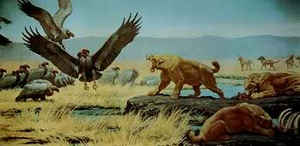Colorado State Fossil
Plated Dinosaur

(Stegosaurus stenops)
Adopted on April 28, 1982
A fourth-grade class campaigned across the state for two years to designate Stegosaurus a Colorado symbol. Their efforts culminated in an executive order issued by the governor on April 28, 1982 making the Plated Dinosaur, (Stegosaurus stenops,) the official state fossil.
Meaning "armored roof lizard."S. Armatus was the first of the stegosaurus genus to be discovered, it was originally named by Othniel Charles Marsh in 1877 from remains recovered north of Morrison, Colorado. This is one of the species that was discovered during the Bone Wars. Its array of plates and spikes has been the subject of much speculation. The spikes were most likely used for defense, while the plates have also been proposed as a defensive mechanism, as well as having display and thermoregulatory functions.
Colorado State Fossil: Plated Dinosaur

The Stegosaurus lived in the area we now know as Colorado one hundred and fifty million years ago during the Mesozoic era in the Jurassic period. It is believed that a typical Stegosaurus weighed ten tons though its brain weighed only two and one-half ounces. There are only 6 skeletons of the Stegosaurus on public display in the United States, one of which may be viewed at the Museum of Natural History in Denver. This skeleton was discovered by a teacher and students from Canon City High School
The first Stegosaurus fossil was discovered in Colorado by M. P. Felch in 1877. Stegosaur fossils are widely distributed from the United States
to China showing how successful this dinosaur group was.
There are many different types of stegosaur, of which Stegosaurus is the largest. Fossils from three different species of Stegosaurus have now been
identified from the Morrison Formation in the western USA. These finds have included complete skeletons and juveniles.
Stegosaurus had 17 bony plates that were embedded in its back - the plates ran along the Stegosaurus' back and tail in two rows, and the plates alternated in alignment. The largest of these triangular plates was about 2.5 ft (76 cm) tall and just as long. Stegosaurus also had spikes at the end of its flexible tail (these are called thagomizers).
Although Stegosaurus was about the size of a bus, it had a small head (the size of a horse's head) and a brain that was only the size of a walnut!
Characteristics of a Stegosaurus
Stegosaurus was a herbivorous "bird-hipped" dinosaur, which cropped vegetation with its powerful beaked mouth.
- Teeth: a toothless beak, small cheek teeth
- Length: 9 meters (30 feet)
- Food: plants and leaves
- Height: 2.75 meters ( 9 feet)
- How it walked: walked on four legs
- Weight: 1,400 kilograms (3,000 pounds)
- Period: Jurassic
- Type of feeder: plant eater (herbivore)
Colorado Law
The Stegosaurus was designated as the official state fossil on April 28, 1982 by executive order of Governor Richard D. Lamm.
Taxonomic Hierarchy: Plated Dinosaur
Kingdom: Animalia (animals)
Phylum: Chordata (having a spinal cord)
Subphylum: Vertebrata - vertebrates
Class: Archosauria (diapsids with socket-set teeth, etc.)
Order: Ornithischia - bird-hipped dinosaurs
Family: Stegosauridae
Genus: Stegosaurus
Species: Stegosaurus stenops

Some states that lack a "state fossil" have nevertheless singled out a fossil for formal designation such as a state dinosaur, rock, gem or stone.







